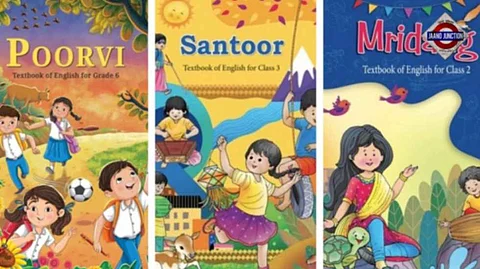

Responding to criticism over naming English-medium school textbooks with Hindi-sounding titles, the National Council of Educational Research and Training (NCERT) has clarified that the names were chosen to reflect India’s cultural roots, not any one language.
In a public response, NCERT said the textbook names are from various Indian languages and were carefully selected for their cultural and educational value.
“The names of the books are from Indian languages and not specifically Hindi,” the council stated.
Examples cited include Mridang, the name of the English textbooks for Classes 1 and 2, named after Mridangam, "a widely recognised percussion instrument associated with Carnatic music."
The Class 3 English textbook is titled Santoor, referring to an instrument with Persian origins but widely played in Indian classical music. The maths book for the same class is titled Maths Mela, blending English and Hindi.
For Hindi and Urdu, the Class 3 textbooks are named Veena and Sitar, respectively -- both musical instruments with deep cultural associations.
Poorvi, the English textbook for Grades 6 and 7, "is named after a raga, traditionally sung at dusk."
The Class 6 math is called Ganita Prakash, while the arts book is Kriti-I, with Kriti meaning "creation" in Sanskrit.
NCERT said these names aim to "promote pride in Indian languages and culture".
The new naming system has faced political pushback. DMK leader A Sarvanan argued in a TV debate that the term Ganita does not represent Tamil linguistic traditions, noting that Kanak is commonly used for maths in Tamil.
Earlier this week, Kerala Education Minister V Sivankutty also questioned the use of Hindi-rooted titles for English-medium books.
Addressing these concerns, NCERT clarified that Ganita Prakash was picked to highlight India’s deep mathematical traditions. “The title has been chosen to attract the curiosity of children about the rich mathematical heritage of the country,” it said in its official response.
Several NCERT textbooks continue to use English names. The Class 8 English textbook is titled Honeydew, the Class 9 book is Beehive, and the Class 10 book is First Flight.
The council maintained that the naming choices are part of an effort to connect students with "India’s culture and knowledge systems", not enforce a language preference.
